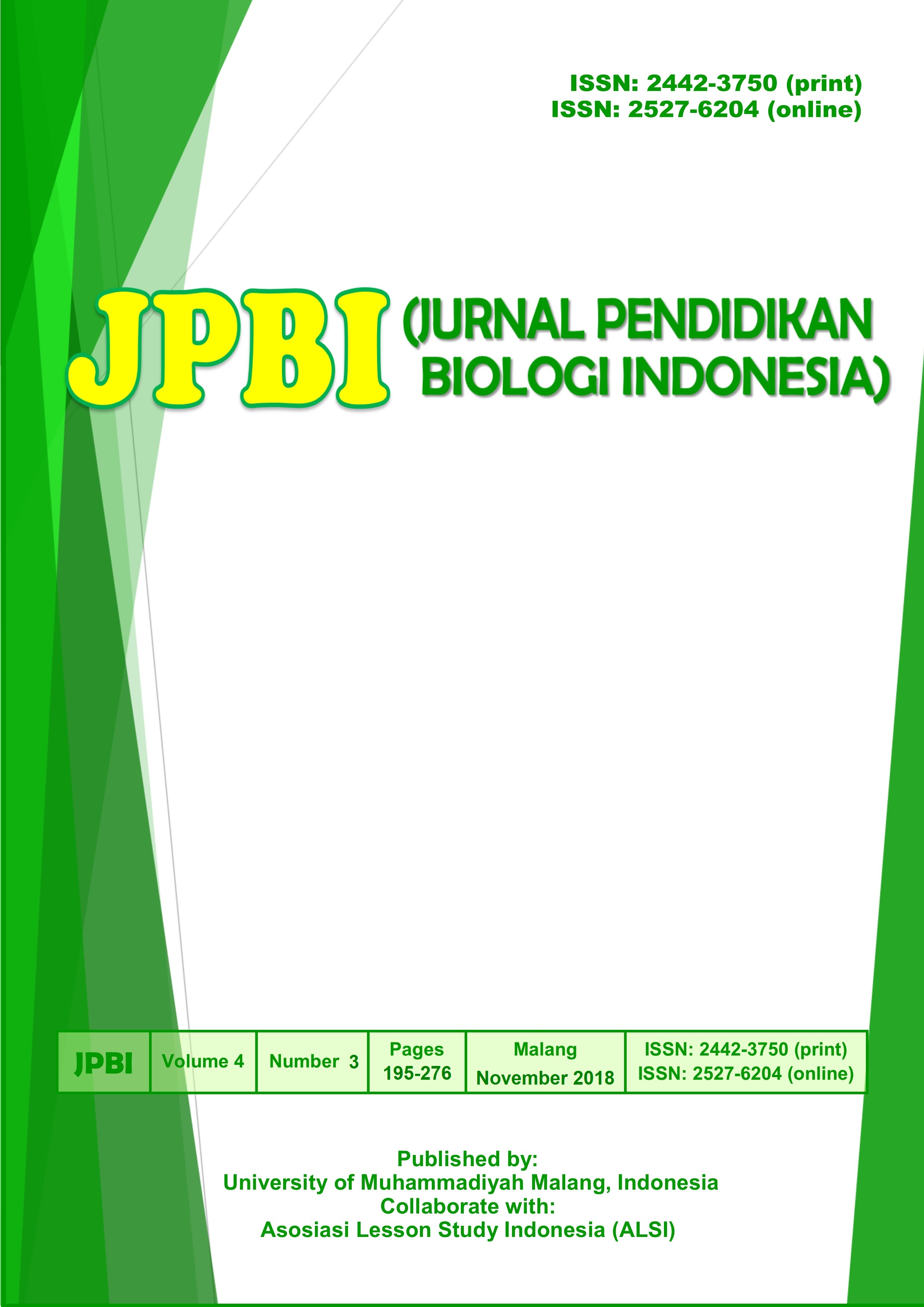Developing of guided inquiry-based biochemistry practicum guidebook
DOI:
https://doi.org/10.22219/jpbi.v4i3.6857Keywords:
Biochemistry, guided inquiry, practicum guidebookAbstract
There were no practicum guidebook in Biochemistry hands-on activity at IKIP Budi Utomo, Malang city, East Java-Indonesia. The purposeof this study was to develop a guided inquiry-based biochemistry practicum guidebook for students of IKIP Budi Utomo. The development of guidebook followed the 4D-Thiagajaran model which has 4 stages, namely define, design, develop, and disseminate. The types of the data in this study were qualitative and quantitative. The qualitative data was obtained from the validator suggestions. The quantitative data was obtained through validator assessment scores and legibility tests. The instruments used to collect data included validation sheets and questionnaires. The results showed that the practicum guidebook validation percentages were 93.48% (material experts), 100% (learning media expert), and 81.5% (teacher) which were categorized as very feasible. It can be concluded that the biochemistry practicum guidebook is highly suitable to be implemented.
Downloads
References
Almuntasheri, S., Gillies, R. M., & Wright T. (2016). The effectiveness of a guided inquiry-based, teachers’ professional development programme on Saudi students’ understanding of density. Science Education International, 27(1), 16–39.
Garrison, K., & FitzGerald, L. (2016). “It’s like stickers in your brain” Using the guided inquiry process to support lifelong learning skills in an australian school library. In International Association of School Librarianship Annual Conference 2016 (pp. 1–18). Brantford: International Association of School Librarianship. Retrieved from https://search.proquest.com/openview/8f4cb292de376f79e3e60b8dd9ce9b0d/1?pq-origsite=gscholar&cbl=26551
Ibe, H. (2013). Effects of guided-inquiry and expository teaching methods on senior secondary school students’ performances in Biology in Imo State. Journal of Education Research and Behavioral Sciences, 2(4), 51–57. Retrieved from http://www.apexjournal.org/JERBS
Joyce, B., & Weil, M. (2000). Models of Teaching (5th ed.). Prentice-hall of India.
Kuhlthau, C. C., Maniotes, L. K., & Caspari, A. K. (2007). Guided inquiry learning in the 21st century (1 edition:). USA: Libraries Unlimited.
Maniotes, L. K., & Kuhlthau, C. C. (2014). Making the shift: From traditional research assignments to guiding inquiry learning. Knowledge Quest, 43(2), 8–17. Retrieved from https://files.eric.ed.gov/fulltext/EJ1045936.pdf
Munika, M., Mujamil, J., & Desi, D. (2014). Pengembangan petunjuk praktikum larutan asam basa berbasis inquiry pada mata kuliah praktikum kimia dasar II di FKIP Universitas Sriwijaya (Vol. 00). Palembang. Retrieved from http://ejournal.unsri.ac.id/index.php/jurpenkim/article/view/1896
Munir, M., & Sholehah, H. (2018). Pengembangan petunjuk praktikum Matlab dan Uji Efektivitasnya pada Mahasiswa Semester IV Jurusan Pendidikan Matematika IAIN Mataram. Jurnal Ai-Muta’aliyah STAI Darul Kamal NW Kembang Kerang, I(3), 56–69.
Nengsi, S. (2016). Pengembangan penuntun praktikum biologi umum berbasis inkuiri terbimbing mahasiswa biologi STKIP Payakumbuh. Jurnal IPTEKS Terapan, 10(1), 47–55. https://doi.org/10.22216/jit.2016.v10i1.343
Putri, Z. M., Hasnunidah, N., & Yolida, B. (2018). Pengembangan buku penuntun praktikum struktur dan fungsi tumbuhan dengan model argument-driven inquiry (ADI). Bioterdidik, 1(1). Retrieved from http://jurnal.fkip.unila.ac.id/index.php/JBT/article/view/15195
Sadjati, I. M. (2012). Pengembangan bahan ajar. In Hakikat bahan ajar (pp. 1–62). Jakarta: Universitas Terbuka. Retrieved from http://repository.ut.ac.id/4157/
Salirawati, D. (2010). Optimalisasi pendidikannilai/karakter dalam pendidikan kimia masa depan. In Seminar Nasional Kimia dengan tema Profesionalisme Peneliti dan Pendidik dalam Riset dan Pembelajaran Kimia yang Berkualitas dan Berkarakter (pp. 1–12). Yogyakarta: Jurusan Pendidikan Kimia UNY.
Sandika, B., & Fitrihidajati, H. (2018). Improving creative thinking skills and scientific attitude through inquiry-based learning in basic biology lecture toward students of biology education. JPBI (Jurnal Pendidikan Biologi Indonesia), 4(1), 23–28. https://doi.org/10.22219/jpbi.v4i1.5326
Sugiyono, S. (2011). Metode penelitian kuantitatif, kualitatif dan R&D. Bandung: Alfabeta.
Suryaningsih, Y. (2017). Pembelajaran berbasis praktikum sebagai sarana siswa untuk berlatih menerapkan keterampilan proses sains dalam materi biologi. Bio Educatio, 2(2), 49–57. Retrieved from http://jurnal.unma.ac.id/index.php/BE/article/view/759
Thiagarajaan, S., Semmel, D. G., & Semmel, M. I. (1974). Instructional development for training teachers of exceptional children: A sourcebook. Bloomington, Indiana: Indiana Univ., Center for Innovation in Teaching the Handicapped.
Wahyuni, S. (2015). Pengembangan petunjuk praktikum IPA untuk meningkatkan kemampuan berpikir kritis siswa SMP. Jurnal Pengajaran MIPA, 20(2), 196–203. https://doi.org/10.18269/jpmipa.v20i2.585
Zulaiha, H., & Ibrahim, A. R. (2014). Keterampilan proses sains di SMA. Palembang. Retrieved from https://ejournal.unsri.ac.id/index.php/jurpenkim/article/view/2228
Downloads
Published
Issue
Section
License
Authors who publish with JPBI (Jurnal Pendidikan Biologi Indonesia) agree to the following terms:
- For all articles published in JPBI, copyright is retained by the authors. Authors give permission to the publisher to announce the work with conditions. When the manuscript is accepted for publication, the authors agree to automatic transfer of the publishing right to the publisher.
- Authors retain copyright and grant the journal right of first publication with the work simultaneously licensed under a Creative Commons Attribution-ShareAlike 4.0 International License that allows others to share the work with an acknowledgment of the work's authorship and initial publication in this journal.
- Authors are able to enter into separate, additional contractual arrangements for the non-exclusive distribution of the journal's published version of the work (e.g., post it to an institutional repository or publish it in a book), with an acknowledgment of its initial publication in this journal.
- Authors are permitted and encouraged to post their work online (e.g., in institutional repositories or on their website) prior to and during the submission process, as it can lead to productive exchanges, as well as earlier and greater citation of published work (See The Effect of Open Access).

This work is licensed under a Creative Commons Attribution-ShareAlike 4.0 International License.


















